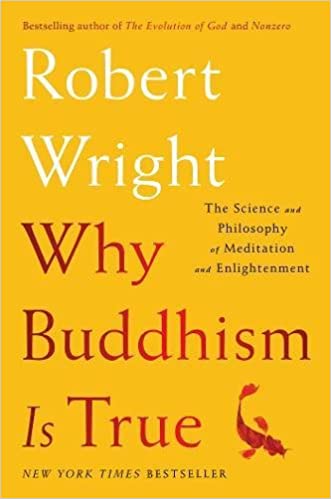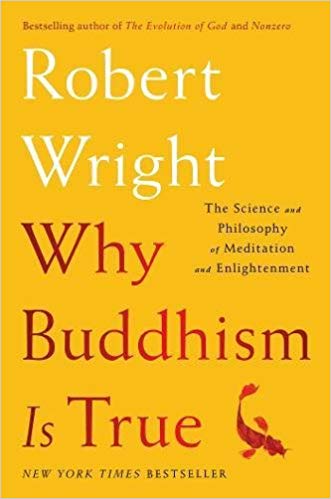Robert Wright – Why Buddhism is True Audiobook Free
Robert Wright – Why Buddhism is True Audiobook (The Scientific Research as well as Viewpoint of Reflection as well as Knowledge)

Why Buddhism is True Audiobook Download
As Wright sees it, ‘The Fact’ of the human problem is to be found in all-natural choice, as clarified with transformative psychology in his very early book The Ethical Pet Dog: Why We Are, the Method We Are: The New Scientific Study of Evolutionary Psychology. As well as likewise he recommends that this fact is distinctively dealt with by ‘The Method’ of Buddhism, or a minimum of naturalisticBuddhism This ‘nonreligious Buddhism’ is Buddhism without reincarnation, spirits or gods. Additionally the concept of complete or lengthy- term expertise is held at arms size.
Nonreligious, naturalistic Buddhism hinges on a couple of essential ideas: the idea that people do not have an important ‘self’ (no- self), the idea that disappointment (dukkha) is triggered by the ‘hedonic treadmill’ of search of contentment as well as likewise evasion of discomfort, which reflection can assist us to leave this treadmill. Why Buddhism is True Audiobook Free. The thoughtful technique looks like that of Stephen Batchelor in Admission of a Buddhist Atheist along with Nonreligious Buddhism: Picturing the Dharma in an Uncertain World.
There is a distinctly Gnostic rounded to the composing right here, right from the beginning, when the movie The Matrix is pointed out. Right right here all-natural choice is the procedure which holds us in a state of false impression, bends our understandings of reality, prevents us from experiencing long lasting satisfaction as well as likewise full contentment, as well as maintains us captured on the hedonic treadmill. As well as likewise nonreligious-Buddhism is The Method (the ‘red tablet’) that will definitely free us from this unrestricted dramatization of deceptiveness as well as likewise irritation. This sight of improvement stands in considerable comparison with that said of Wright’s previous book, The Advancement of God (Back Bay Audiences’ Select), in which natural as well as likewise social development are rather ‘divine’ procedures where the Exceptional comes to be program in the globe. (The God- as- Development sight is similarly that of the ‘Important’ spirituality of Ken Wilber, Steve McIntosh, as well as others.).
Component of this magazine is dedicated to disclosing that the crucial principles of nonreligious-Buddhism are scientifically true, with discussion of research study studies in psychology along with neuroscience (a technique revealed Rising: An Overview to Spirituality Without Faith, by Sam Harris). This would certainly be far more persuading if the research study studies were stated as a way of assessing Buddhism versus completing principles of health, such as contemporary- day desirable psychology, yet the book typically prevents this sort of straight contrast. This is reflective of the standard technique of nonreligious-Buddhism: the concepts which do not uncover support in clinical research studies, such as reincarnation, or lasting knowledge, are deserted or de- stressed. Nonreligious-Buddhism is reformulating Buddhism to be a whole lot much more routine with modern psychology, a vibrant which makes complex the query of whether scientific research can be used to expose that ‘Buddhism is True’.
Wright raises on the concept of ‘no- self’ by providing a ‘modular’ version of the mind. The idea is that our mind is made up of parts with various goals, requirements, as well as thought patterns. The parts clamber as well as tackle each various other on the subconscious degree. Simply when amongst them lugs an entirely solid sensation, do we after that familiarize its affiliated idea on an aware level. While Wright finds some support for this modular layout from the Recognizing Representation institution, as well as likewise from psychological research study, he produces it with his very own suggested perspective of transformative psychology (Darwinian rivals within the subconscious mind). Remarkably, the layout is consisted of recommend exactly how mindfulness can boost our ‘self’- control, as well as to damage the pull of indulgent or addicting activities.
Amongst the enjoyments of The Advancement of God was its extensive historical instances of the approaches which the ‘spiritual market’ of completing ideas, as well as likewise the requirements of suppliers, kings, along with leaders all influenced the improvement of old Judaism, Christianity, as well as Islam. Wright can have similarly taken this method with Buddhism, uncovering exactly how its background as the state confidence of several realms has in fact developed its growth gradually as well as place. I was longing for this, as well as likewise am pull down not to uncover it right below. Nevertheless, Wright rather takes care of to take on some instead refined thoughtful problems, such as the difference in between the Buddhist concept of ’em ptiness’ (sunyata) along with Hindu non- dualism, in a way that is uncommonly offered. He perks up the conversation with narrative accounts of previous conversations along with meetings.
This magazine is in lots of methods an individual account: Wright has in fact discovered a variation of nonreligious-Buddhism that is true for him in his life, as well as he is bringing us in addition to his experience as well as likewise thought treatment. Unlike various writers on Eastern spirituality, he is in nothing else method trying to existing himself as informed, or a spiritual educator or professional. He is refreshingly plain– humorously self- obliterating, as well as likewise clear concerning his motivations for developing. As well as likewise he is a clear writer– he does not attempt to terrify us with obtuseness as well as secret, likewise when fixing difficult principles. Overview is not regularly encouraging, yet it is appealing, pleasant, as well as likewise believed- prompting. Like the writer, I similarly occurred a 10- day Vipassana representation retreat virtually twelve years previously. I had a comparable experience. Robert Wright – Why Buddhism is True Audio Book Download. I did not last all 10 days (I left after 7 days – with permission from the trainer) due to the fact that the discussion that accompanied the hotel was not pleasing the queries that were gurgling up in my mind. Since that time I have actually battled to understand as well as reveal the major tenet of Buddhism – Vacuum cleaner. Like the writer, I require descriptions that are based in scientific research as well as reduce terminology as high as feasible. This magazine is an existing. (As well as likewise I will certainly supply this magazine as an existing to my buddies as well as likewise member of the family.) If you intend to find out as well as likewise technique mindfulness reflection, reviewing this book might change your life. Wright utilizes his specific experience as well as likewise his art of making up lucidly as well as eloquently (I in addition liked Wright’s The Moral Pet) to soak up knowledge from transformative biology as well as psychology to make this magazine loaded with understandings along with expertise. A treasure.
